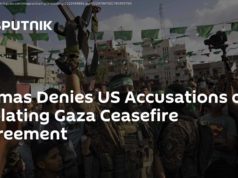The 82 Chibok schoolgirls freed from the clutches of Boko Haram have been flown by helicopter (pictured) to the Nigerian capital of Abuja to meet the president after their release was negotiated
The 82 freed Chibok schoolgirls arrived in Nigeria’s capital on Sunday to meet President Muhammadu Buhari three years after their mass abduction.
Anxious families awaited an official list of names and looked forward to reuniting three years after the mass abduction.
The 82 girls were freed Saturday in exchange for an unspecified number of detained suspected Boko Haram extremists, Buhari’s office said in a statement.
This is the largest negotiated release so far of the nearly 300 girls whose abduction in 2014 highlighted the threat of Nigeria’s homegrown extremists who are linked to the Islamic State group.
Boko Haram fighters stormed the Government Girls Secondary School in the remote town of Chibok on the evening of April 14,2014 and kidnapped 276 girls.
Fifty-seven managed to escape in the hours that followed but the remaining 219 were held by the group.
Before Saturday’s release, 195 of the girls had been captive. Now 113 of the girls remain unaccounted for.
A first group of 21 girls were released in October as Nigeria announced it had begun negotiations with the extremist group. At the time, the government denied making an exchange for Boko Haram suspects or paying ransom.
The girls released in October have been reported to be in government care in Abuja for medical attention, trauma counseling and rehabilitation, according to the government.
Human rights groups have criticized the decision to keep the girls in custody in Abuja, more than 500 miles from Chibok.
The International Committee of the Red Cross, which along with the Swiss government mediated months of negotiations between Nigeria’s government and Boko Haram, said the newly released girls soon would meet with their families.
The ICRC also tweeted what the first public image of the freed schoolgirls on Sunday, showing a line of young women wearing shirts with the ICRC logo waiting to board a helicopter.
The ICRC said it had acted as a neutral intermediary to transport the freed girls into Nigerian government custody.
Long-suffering family members said they were eagerly awaiting a list of names and their ‘hopes and expectations are high.’
The Bring Back Our Girls campaign said Sunday it was happy that Nigeria’s government had committed to rescuing the 113 remaining schoolgirls.
It said: ‘We urge the president and his government to earnestly pursue the release of all our Chibok girls and other abducted citizens of Nigeria, ‘ the group said in a statement.
The 276 schoolgirls kidnapped from Chibok in 2014 are among thousands of people abducted by Boko Haram over the years.
The mass abduction brought the extremist group’s rampage in northern Nigeria to world attention and began years of heartbreak for the families of the missing schoolgirls.
Many of the captive girls, most of them Christians, were forced to marry their captors and give birth to children in remote forest hideouts without knowing if they would see their parents again.
It is feared that other girls were strapped with explosives and sent on missions as suicide bombers.
President Buhari late last year announced Boko Haram had been ‘crushed, ‘ but the group continues to carry out attacks in northern Nigeria and neighboring countries. Its insurgency has killed more than 20,000 people and driven 2.6 million from their homes, with millions facing starvation.
Enoch Mark, a Christian pastor whose two daughters were among those kidnapped, said he was told of the release by the Bring Back Our Girls pressure group and an official in Maiduguri.
He added: ‘This is good news to us. We have been waiting for this day. We hope the remaining girls will soon be released.’
Boko Haram has waged an insurgency aimed at creating an Islamic state that has killed thousands and displaced more than 2 million people.
Despite the army saying the insurgency is on the run, large parts of the northeast, particularly in Borno state, remain under threat from the militants, and suicide bombings and gun attacks have increased in the region since the end of the rainy season late last year.






